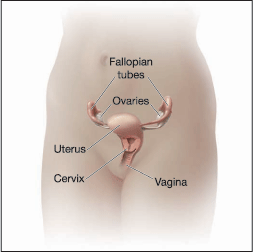|
Basic Facts About Cervical Cancer
The picture below shows a woman's reproductive organs.
- The cervix is the lowest part of the uterus. It forms an
opening between the uterus and the vagina.
- The uterus, or womb, is where the baby grows when a
woman is pregnant.

- Sometimes cells in a woman's cervix begin to grow in an
abnormal and disorganized way.
- These abnormal cells may not be cancer yet. Without
treatment, they can become cancer.
- Most of the abnormal changes in the cells of the cervix do
not cause any symptoms in the beginning. That is why it
is important to get a Pap test. It will help to see if there
are any early changes in the cells.
- A "negative" test result means that no cell changes were
found. A "positive" result means that there might be cell
changes.
- If there are changes, your doctor will treat them before
they turn into cancer cells. With the help of your doctor,
you can prevent cervical cancer.

|
Consuelo:
I take care of
myself and I feel great. Why
do I need a Pap test?
|
 Doctor Vargas:
"Although
you may feel
healthy, the
abnormal changes that can
end up as cancer can
appear without any
symptoms. This can
happen even when you are
feeling great. That is why it
is important to get regular
Pap tests."
Doctor Vargas:
"Although
you may feel
healthy, the
abnormal changes that can
end up as cancer can
appear without any
symptoms. This can
happen even when you are
feeling great. That is why it
is important to get regular
Pap tests."
|
< Previous Section | Next Section > |